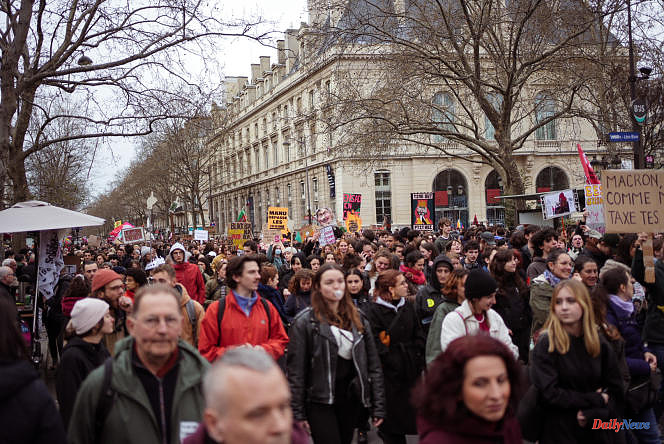At the end of a tenth day of action against the pension reform, Tuesday March 28, the inter-union announced that it was planning a new mobilization on Thursday April 6 and was invited by the Prime Minister, Elisabeth Borne, to Matignon at the start of next week.
In the street, the mobilization figures of the authorities as well as the unions were down compared to Thursday, March 23. The Ministry of the Interior has identified 740,000 demonstrators throughout France, including 93,000 in Paris, the CGT "more than 2 million" including 450,000 in the capital.
Guest of the Quotidien program on TMC, in the evening, the secretary general of the CFDT Laurent Berger mentioned the invitation of Ms. Borne after weeks of absence of dialogue between the two parties. " We will go. We talked about it among ourselves. Yes, we collectively think that we have to go there to bring our proposals, "said Laurent Berger.
The trade unionist said he wanted to include in this exchange his proposal to start mediation between the unions and the government in the conflict over pensions, despite the fact that this hypothesis was swept away by the spokesperson for the executive, Olivier Véran, during the day. Asked by Agence France-Presse, Matignon confirmed the invitation but made no comment on his agenda. “What is certain is that we will go and discuss pensions. And work because that goes with it, but [especially] pensions! Mr. Berger insisted. The Constitutional Council must decide on the bill within three weeks.
On Tuesday, like last week, clashes between demonstrators and the police erupted in several cities while the violence around the basin of Sainte-Soline (Deux-Sèvres), during the weekend, was mentioned in the processions. In Paris, where 10,000 checks took place around the procession, a Leclerc business was looted and several trash can fires lit before clashes at the finish at Place de la Nation. The police headquarters reported, around 8:30 p.m., 55 arrests.
Tensions also in Dijon, Lyon, Lille and Toulouse, where the police used water cannons. Nantes, Bordeaux, Strasbourg, Besançon and Nancy also experienced clashes. Fearing these incidents, Interior Minister Gérald Darmanin had deployed an "unprecedented security device": 13,000 police and gendarmes, including 5,500 in the capital. "France does not drive itself with cudgels," replied the rebellious Jean-Luc Mélenchon, calling on his troops to be "cold".
On the ground, opposition to the reform remains strong. Train traffic was disrupted, with three out of five TGVs and one out of two TERs on average, according to the SNCF. In Paris, Lorient and Marseille, demonstrators invaded the railway tracks. The Eiffel Tower was also closed, like the Arc de Triomphe or the Palace of Versailles.
On the other hand, among Parisian garbage collectors, the CGT announced the suspension of the strike and the blocking of incinerators from Wednesday, while 6,600 tonnes of waste still litter the streets of the capital. If the teachers were less mobilized (8% of strikers according to the ministry), dozens of blockades of universities, high schools and even colleges were recorded, from Avignon to Le Havre, from Lille to Bordeaux. The mobilization of young people, watched like milk on the fire by the authorities, has also marked time: they were 400,000 in the street according to the statements of the Unef, against 500,000 on March 23.












